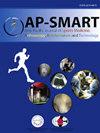体外冲击波疗法的早期干预对肩袖愈合具有长期的积极影响:为期三年的随机对照试验
IF 1.4
Q3 ORTHOPEDICS
Asia-Pacific Journal of Sport Medicine Arthroscopy Rehabilitation and Technology
Pub Date : 2024-10-01
DOI:10.1016/j.asmart.2024.09.004
引用次数: 0
摘要
背景体外冲击波疗法(ESWT)对肩袖修复术的长期影响尚不清楚。目的研究肩袖修复术后 3 年随访时 ESWT 的功能结果和结构变化。方法进行了一项随机临床试验,包括接受肩袖修复术的患者。根据患者术后 3 个月是否接受桡侧 ESWT,将其分为两组。ESWT 组接受为期 5 周的康复治疗,每周进行一次 ESWT,而对照组只接受康复治疗。在 3 个月(基线)、6 个月和 3 年的随访中,对视觉模拟量表(VAS)疼痛评分和功能评分进行了分析。此外,还使用核磁共振成像和超声波检查评估肌腱的成熟度、完整性、肌腱质量、肩峰距离(AHD)和肌肉脂肪浸润。在最后的随访中,ESWT 组有 2 名患者(16.5%)出现肩袖功能衰竭,而对照组有 1 名患者(6.25%)出现肩袖功能衰竭(P = 0.176)。与对照组相比,ESWT 治疗在 VAS 疼痛评分、功能评分、肌腱质量、AHD 和肌肉脂肪浸润方面显示出相似的临床结果(Ps > 0.05)。磁共振成像分析表明,ESWT 治疗后,肌腱愈合情况在 6 个月(P = 0.036)和 3 年随访(P = 0.028)时均有所改善。本文章由计算机程序翻译,如有差异,请以英文原文为准。
Early intervention of extracorporeal shockwave therapy sustained positive long-term effect on rotator cuff healing: A randomized controlled trial with 3-year follow-up
Background
The long-term effects of extracorporeal shockwave therapy (ESWT) on rotator cuff repair are unknown.
Objectives
To investigate the functional outcomes and structural changes of ESWT at 3-year follow-up after rotator cuff repair.
Methods
A randomized clinical trial was conducted, including patients who underwent rotator cuff repair. The patients were assigned to two groups based on whether they underwent radial ESWT 3 months postoperatively. The ESWT Group received 5 weeks of rehabilitation and ESWT weekly, whereas the CONTROL Group received only rehabilitation. Visual analog scale (VAS) pain score and functional scores were analyzed at 3 months (baseline), 6 months, and 3 years follow-up. In addition, MRI and ultrasonography were used to assess tendon maturation, integrity, tendon quality, acromiohumeral distance (AHD), and muscle fatty infiltration.
Results
Finally, 32 participants completed all the assessments. At the final follow-up, 2 patients in the ESWT Group (16.5 %) versus one patient in the CONTROL Group (6.25 %) had rotator cuff failure (P = 0.176). The ESWT treatment showed similar clinical outcomes in VAS-pain score, functional scores, tendon quality, AHD, and muscle fatty infiltration versus the CONTROL Group (Ps > 0.05). MRI analysis indicated improved tendon healing after ESWT treatment at both 6-month (P = 0.036) and 3-year follow-up (P = 0.028).
Conclusion
Early intervention with radial ESWT sustained long-term effects on the healing of the repaired rotator cuff and similar functional outcomes at long-term follow-up compared with standard rehabilitation.
求助全文
通过发布文献求助,成功后即可免费获取论文全文。
去求助
来源期刊
CiteScore
3.80
自引率
0.00%
发文量
21
审稿时长
98 days
期刊介绍:
The Asia-Pacific Journal of Sports Medicine, Arthroscopy, Rehabilitation and Technology (AP-SMART) is the official peer-reviewed, open access journal of the Asia-Pacific Knee, Arthroscopy and Sports Medicine Society (APKASS) and the Japanese Orthopaedic Society of Knee, Arthroscopy and Sports Medicine (JOSKAS). It is published quarterly, in January, April, July and October, by Elsevier. The mission of AP-SMART is to inspire clinicians, practitioners, scientists and engineers to work towards a common goal to improve quality of life in the international community. The Journal publishes original research, reviews, editorials, perspectives, and letters to the Editor. Multidisciplinary research with collaboration amongst clinicians and scientists from different disciplines will be the trend in the coming decades. AP-SMART provides a platform for the exchange of new clinical and scientific information in the most precise and expeditious way to achieve timely dissemination of information and cross-fertilization of ideas.

 求助内容:
求助内容: 应助结果提醒方式:
应助结果提醒方式:


